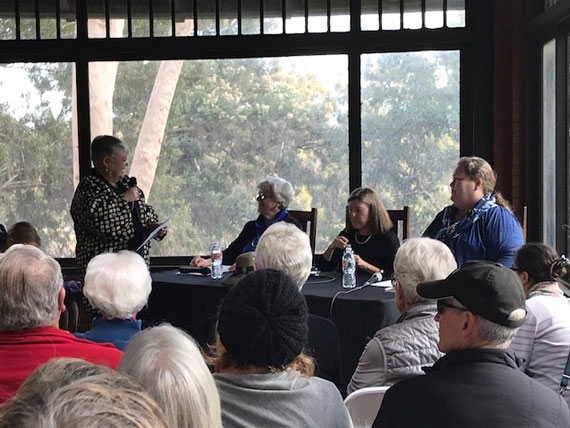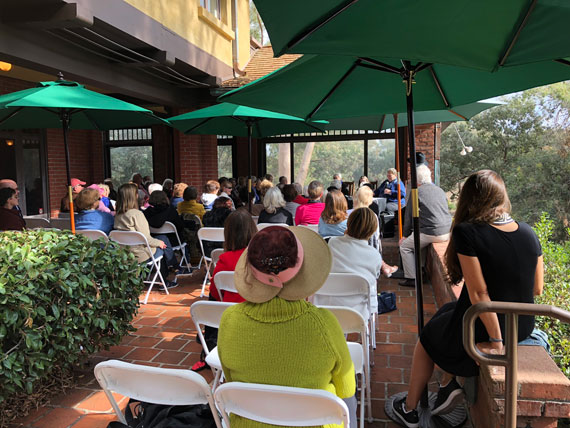|
Terrace Talks Series Attracts 120; More to Come This Year
By Bobbie Bagel
January/February 2019
 Photo by A. Hayes |
 Photo by Robert Veres |
The Marston House's clay-tiled terrace runs the entire length of the home, facing the gently sloping expanse of the south lawn. From the elevated terrace, you see the enormous eucalyptus trees planted when the house was first built over 110 years ago. There are also sweeping views across Cabrillo Canyon. This is the inviting setting for SOHO's new Terrace Talks.
We launched the series with the opening of the new permanent exhibition The Marston Legacy: Progress and Preservation, which is on display throughout the house. These talks are designed to complement the exhibit's themes of progressive social change, historic preservation, workers' rights, parks and open space, and more. They are meant to encourage conversation and discussion on a variety of engaging topics sparked by the remarkable Marston family, led by George W. Marston, and their lasting contributions to San Diego.
Our first talk in October featured Welton Jones, former San Diego Union-Tribune drama critic and past SOHO board member, and Roger Showley, recently retired U-T reporter and columnist. With broad knowledge and humor, they discussed George Marston's achievements in civic life, philanthropy, and business. Rick Crawford, manager of Special Collections at the San Diego Central Library, was the moderator.
Jones concentrated on George Marston's character. He said Marston's main attribute was his integrity. Showley explained that Marston was so highly regarded by business and community leaders that whenever there was need for a major undertaking in the city, they just said "Let George do it," and they knew he would get it done.
They punctuated their remarks with quotations like this one from George Marston, quoted in Mary Marston's biography of her father. In an address to the Wednesday Club in 1943, he said, "Business is far more than making money. It can be developed into an art. It trained me…to exercise patience and perseverance. It develops the capacity to make decisions quickly and with judgment. Good judgment is a great personal quality. It saves disastrous mistakes."
An audience of more than 50 people peppered the speakers with questions comparing Marston to public officials today, and asking how Marston might handle contemporary issues like homelessness. There was a great deal of enthusiastic discussion and complete agreement on the extraordinary nature and accomplishments of George W. Marston.
The second talk, "Progressive San Diego Women of the Early 20th Century," followed in early December. Three eminently qualified speakers—horticultural expert Nancy Carol Carter, USD History Professor Molly McClain, and architectural historian Sarai Johnson—discussed 10 leading women in San Diego history.
Carter spoke about the extraordinary life of the premier horticulturist and nurserywoman Kate Sessions. Sessions transformed San Diego with her plantings, including hundreds of trees in Balboa Park, and botanical experimentation. Carter also discussed Mary B. Coulston, a journalist who championed the benefits of public parks, and Mary Katharine Brandegee, a botanist, scientific author, and the third woman to graduate from University of California Medical School.
McClain described the contributions of newspaper magnate and philanthropist Ellen Browning Scripps, noted artist Alice Klauber, and Dr. Charlotte Johnson Baker, the first woman to practice medicine in San Diego.
Johnson portrayed the four Marston sisters, daughters of George and Anna. All Wellesley graduates, Helen stands out as the boldest, most progressive among them. As a very young woman, she sought to protect WW I refugees, worked in settlement houses with pioneering social worker Jane Adams, campaigned for striking farmworkers, and, at the age of 73, joined the civil rights march in Selma, Alabama.
All three speakers emphasized that the women they spoke about were highly successful in their chosen fields, meanwhile confronting prejudice and discrimination in their male-dominated professions. They persisted in their careers while also advocating for suffrage, feminist causes, abolition, and social reform. In short, they were remarkable.
Nearly 70 people attended this talk. Everyone was clearly inspired by the presentations. There were many questions about why, with the exception of Scripps and Sessions, these women's stories were not widely known. And there was a clear determination to find ways to preserve more overlooked biographies like these for the future.
Please watch for the announcement of SOHO's 2019 Terrace Talks in the next issue of Our Heritage eNews. We hope you will join us on the terrace.
|
2025
2024
2023
2022
2021
2020
2019
2018
2017
2016
2015
|





